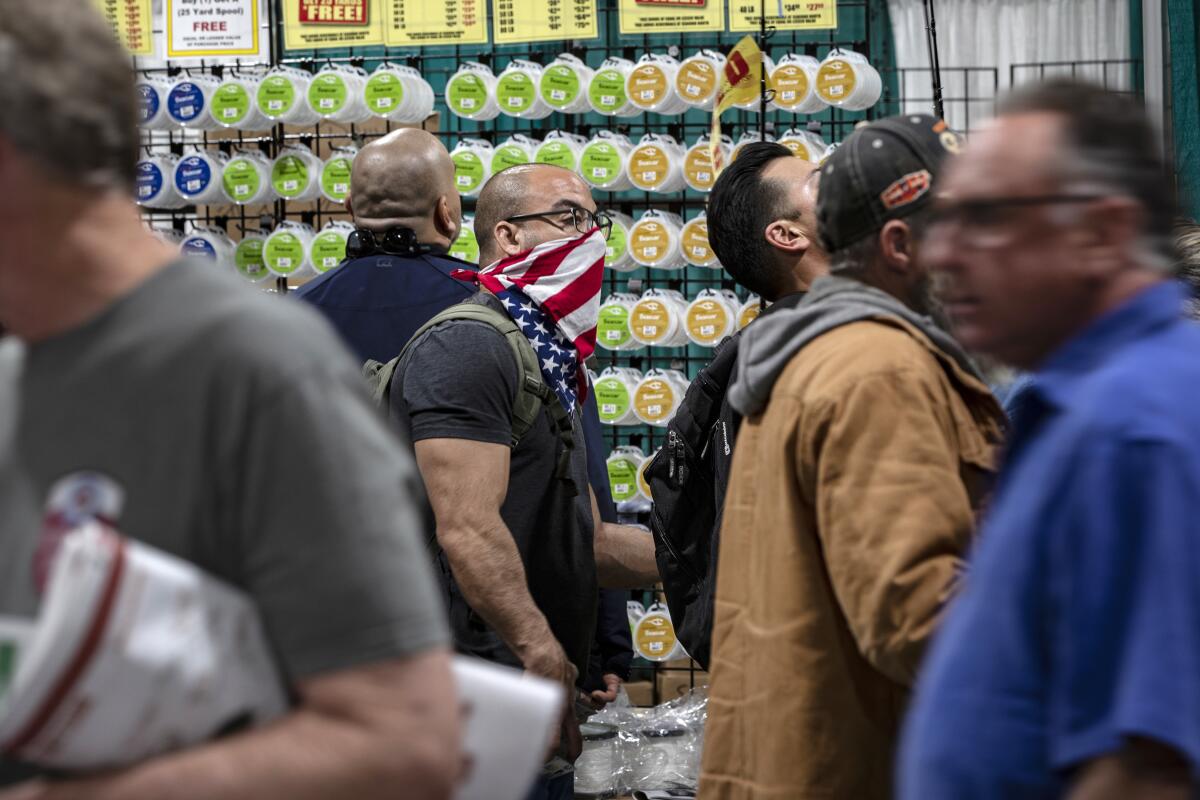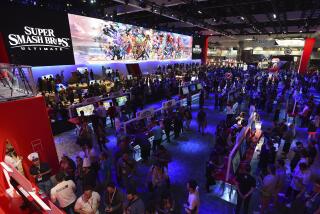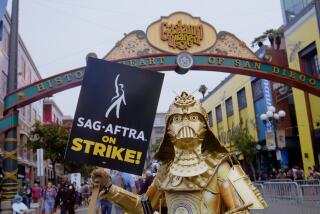Empty halls. No handshakes. What happens when coronavirus cancels conferences

- Share via
As the coronavirus outbreak spreads, a Santa Monica tech conference sought to reassure its attendees that they would be safe — because it would be watching them.
Organizers of the Montgomery Summit hired medical staff to watch the gathering of about 600 people this week. If any showed signs of sickness, organizers said, they would be asked to leave.
Doorknobs were wiped down over and over. Handshakes were shunned. After the keynote panel, attendees made a beeline for a nearby table stocked with hand sanitizer.
“It’s just a precaution,” Michael Reitblat, chief executive and co-founder of fraud prevention company Forter, said as he disinfected his hands. “I’m not going to stop going to conferences because of the coronavirus.”
That is, if the conferences are even happening. Many conventions and trade shows are proceeding, but many others have been canceled, postponed or refashioned into online-only events.
That means exhibitors eager to show off samples won’t be able to reach nearly as many potential buyers. Concessionaires peddling snacks on the convention floor won’t see that rush of business. Convention centers will stand empty. Nearby hotels and restaurants will take a hit too.
And without crowds of people ready to network, away goes a key opportunity for making the kinds of face-to-face connections that lead to business deals.
Or food-to-mouth connections. “One of the most important things you can do in the food business is get try-out of your product,” said Alex Corsini, founder and CEO of Alex’s Awesome Sourdough, an organic pizza company in the San Francisco Bay Area that had planned to attend a now-canceled expo in Anaheim. “We want people to taste the difference. The more we can get in front of people, the better.”
In Europe alone, at least 260 conferences have been canceled because of the coronavirus outbreak, said Sherrif Karamat, president and chief executive of PCMA, a trade association representing the business events industry. Most of those were in Italy, where more than 3,000 people have been diagnosed with the virus.
In the U.S., several major industry gatherings, ranging from Facebook’s F8 developer conference in San Jose to an oil-and-gas convention in Houston, have been canceled. Others were postponed after many scheduled attendees dropped out.
Major companies have clamped down on their workers’ travel for fear of exposure to the virus. And when key players don’t go to a conference, it’s often not worthwhile for anyone else either.
“We spend so much money to go to a show,” said Jeffrey Ovadya, director of sales, support and marketing for motion-capture company Vicon Motion Systems. “If half the potential customers don’t show up ... then is it worth the cost of going?”
Over the last 20 years, the conference and convention industry has grown rapidly as the global economy has expanded.
In 2017, about $1 trillion was spent worldwide on business events, including funds to plan and produce the events and related travel, according to an Events Industry Council report. North America alone accounted for $381 billion.
Convention centers and similar facilities rely on these events to survive, often booking major ones years in advance.
At San Francisco’s Moscone Center, the Game Developers Conference is one of the 10 biggest events of the year, said Bob Sauter, the center’s general manager. That conference was supposed to happen in less than two weeks — but now it’s on hold, and two others at that location, including a Facebook marketing summit, have been canceled since the coronavirus outbreak reached the United States.
With the gaming conference postponed — organizers are aiming to reschedule it for the summer — Moscone Center isn’t yet getting the cash infusion it expected. The facility will probably be empty that week. On such short notice, Sauter said, there’s no time to book a substitute conference for those days.
”We’ve not experienced anything like this before,” Sauter said. “GDC is a very big deal to us. It’s a big blow. But we get it.”
Those two cancellations hurt too. In general, Moscone Center at least gets to keep the deposit for any event that cancels less than 18 months ahead of time. But for good customers, there’s room for negotiation.
Facebook scrapped its marketing summit, but Sauter described the company as a “wonderful” client that comes every year. “We’re certainly not going to do anything to jeopardize our relationship,” he said. But “by the same token, a contract is a contract.”
The Anaheim Convention Center is scrambling too after organizers slammed the brakes on Natural Products Expo West, a natural and organic foods conference that usually draws about 85,000 people and is one of the center’s biggest events, Anaheim city spokesman Mike Lyster said.
Expo organizers said it expected 40% to 60% of attendees to drop out, then put the event on hold the day before it was set to begin. The convention center’s investment in food and the time it had spent setting up: wasted.
Outright cancellations are not refunded. But when clients face unforeseen circumstances, the convention center’s general policy is to absorb some of the pain by helping them reschedule at no additional cost. Expo organizers said they’d announce a new date next month.
“Everything we will have prepared for and worked towards ... will not come to fruition this week,” Lyster said. “This is the nature of the convention business. It doesn’t happen that often, but we prepare for these types of contingencies.”
The business events industry has learned from past public health crises, including the outbreak of severe acute respiratory syndrome, or SARS, which peaked in 2003 and killed nearly 800 people, and the 2009 H1N1 outbreak, which killed hundreds of thousands of people worldwide. Today, conference organizers often insure their events.
But that doesn’t help the companies that rely on large conferences and trade shows to network with retailers and show off their products.
Seattle food exporter Excel Trade had planned to meet with potential customers from more than 30 countries at the expo this week. “As a small company, to try to generate that new business would be virtually impossible without a trade show,” said Sally Cox, the company’s president.
The Anaheim expo is “our Super Bowl,” said Andrew Abraham, founder of Orgain, an Irvine-based company that sells protein powders and shakes. It spent more than $250,000 on expenses related to the conference this year, including travel and accommodations for more than 20 employees.
The expo had been Orgain’s springboard into the mainstream, Abraham said: Whole Foods Market saw the company’s booth 12 years ago and later struck a deal to sell its products at the high-end supermarket chain.
That’s the kind of interest Costa Mesa start-up Opkix was hoping to spark at the Long Beach Convention Center on Wednesday.
The company, which started selling its wearable action-sports cameras just last year, is eager to show off to the hordes at the Fred Hall outdoor-recreation show.
Coronavirus fears didn’t seem to dent the turnout. A steady stream of cars funneled into the convention center parking lot on the event’s first day, and a line of fishing enthusiasts and their families lined up along the building before the gates opened.
“It’s such a big show,” Opkix CEO Lawrence Greaves said. “When people see this product for the first time, they might say to themselves, ‘Hey, this is what I’ve been missing.’”
More to Read
Inside the business of entertainment
The Wide Shot brings you news, analysis and insights on everything from streaming wars to production — and what it all means for the future.
You may occasionally receive promotional content from the Los Angeles Times.













